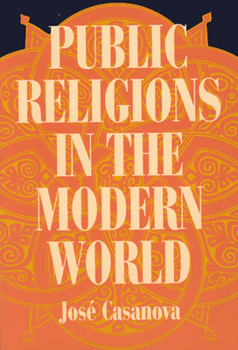Public Religions in the Modern World
Select Format
Select Condition 
Book Overview
In a sweeping reconsideration of the relation between religion and modernity, Jose Casanova surveys the roles that religions may play in the public sphere of modern societies. During the 1980s, religious traditions around the world, from Islamic fundamentalism to Catholic liberation theology, began making their way, often forcefully, out of the private sphere and into public life, causing the "deprivatization" of religion in contemporary life. No longer content merely to administer pastoral care to individual souls, religious institutions are challenging dominant political and social forces, raising questions about the claims of entities such as nations and markets to be "value neutral", and straining the traditional connections of private and public morality. Casanova looks at five cases from two religious traditions (Catholicism and Protestantism) in four countries (Spain, Poland, Brazil, and the United States). These cases challenge postwar-and indeed post-Enlightenment-assumptions about the role of modernity and secularization in religious movements throughout the world. This book expands our understanding of the increasingly significant role religion plays in the ongoing construction of the modern world.
Format:Paperback
Language:English
ISBN:0226095355
ISBN13:9780226095356
Release Date:June 1994
Publisher:University of Chicago Press
Length:330 Pages
Weight:1.07 lbs.
Dimensions:0.8" x 6.1" x 9.1"













